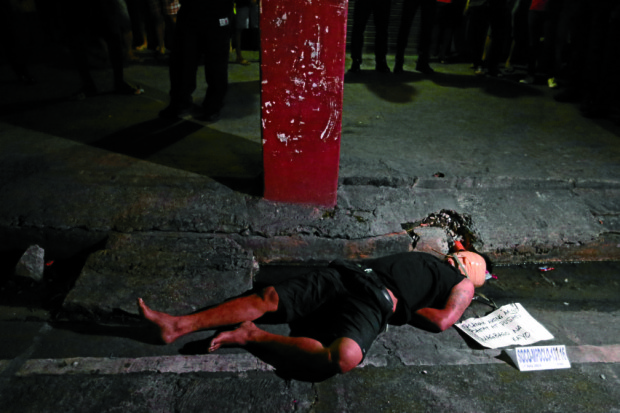Dead’s kin offered psychiatric help

The body of an alleged drug pusher and robber, whose face is wrapped in packaging tape, hands bound and stabbed several times in the chest is found along Lerma Street, Sampaloc, Manila.INQUIRER PHOTO/RAFFY LERMA
SAN PEDRO CITY—The families of suspected drug pushers killed in police operations or by vigilante groups will be given psychiatric help as part of the government’s response to the growing number of fatalities in the war on drugs.
In Cavite, Laguna, Batangas, Rizal, Quezon (Calabarzon), the Department of Health (DOH) has formed a pool of experts to provide psychological help and social support to the families of those who had been killed.
Dr. Rio Magpantay, DOH regional director, said some of the families of those who were killed “have been really depressed.”
“Others are crying for justice,” he said. “I’m sure these people would like to blurt out (their emotions) to relieve them of what they are feeling,” he said.
Regional police records showed that 34,993 people in Calabarzon have surrendered to authorities since the government began its crackdown on illegal drug users and pushers. From July 1 to 31, 1,617 people were arrested, while 70 had been killed.
“We, too, are surprised at what is happening and we are not ready for that,” said Magpantay in a phone interview on Friday. He said the DOH regional office started training health workers to respond to medical and psychological needs of those who surrendered and the families of those killed.
The debriefing program is set to begin on Aug. 15.
Magpantay said the regional DOH office was coordinating with local government units to put together “community-based” rehabilitation programs for addicts.
He said in the region, there is currently only one DOH-run rehabilitation center located in Tagaytay City, Cavite, that can accommodate only 350 people.
Asked about the readiness of families to open up emotionally to state agents, “that’s a challenge we have to face,” Magpantay said, citing the stigma associated with drugs.
He said, though, that the families shouldn’t feel alienated. “The more you do (alienate them), the more (society will have) a different perception of them,” he said.
In his visit to the region on July 30, Philippine National Police Director General Ronald dela Rosa said the government’s antidrug campaign was “right on track” with President Duterte’s instruction to end drug trafficking in six months.
Dela Rosa said the PNP had also tapped the help of Chinese law enforcers to identify and track down Chinese drug lords, responsible for trafficking “tons and tons” of drugs manufactured in China, Taiwan and Hong Kong.